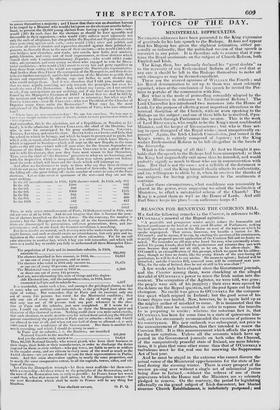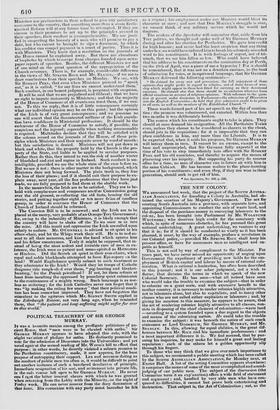REASONS FOR RENEWING THE COERCION BILL.
WE find the following remarks in the Courier, in reference to Mr. O'CONNELL'S renewal of the Repeal agitation.
" A peaceable and prosperous vinter might reduce the honourable and learned gentleman to the level of a very good Member of Parliament, making the best speeches of any man in the House on most of the topics on which he speaks unprepared. That seems, however, too humble a station for Mr. O'Connell ; and lie means, if he can, by exciting the passions of his countrymen, tojustify the proposed present application of the Coercion Bill and its future re- newal. We remember an old man who loved his ease, who continually admo- nished his young friends, that half the misfortunes and miseries they met with arose because they could not sit still, as he sat, in his elbow-chair. Mr. O'Connell is an exemplification of this precept, which we quote for his edifica- tion ; though we have no doubt, like the young friends of the ease-loving old gentleman, he will be deaf to our advice. Ile means to agitate; Ireland will be disturbed ; and the Coercion Bill, renewed now, will be continued next year. Why, for the sake of Ireland, does he not sit still in his arm-chair ? "
A few weeks only have elapsed since the Government journals, and the Courier among them, were chuckling at the alleged downfal of O'CONNELCS power to rouse the Irish nation into dis- content. The occupation of the Agitator, we were told, was gone; the people were sick of his jugglery ; their eyes were opened by the debate on the Repeal question, and the poor figure cut by their champion. No credit was given to O'CONNELL for the compara- tive quiet which reigned in Ireland; but the good sense of his former dupes was lauded. Now, however, he is again held up as the mighty author of mischief to come. It is insinuated that the Coere:en Bill must be reenacted in order to repress the tumults be is preparing to excite; whereas the notorious fact is, that O'CONNELL has been for some time in a state of quiescence him- self, and has strenuously recommended the exercise of patience to his countrymen. His new outbreak was subsequent, not prior to the announcement of Ministers, that they intended to renew the Coercion Bill. It is this announcement which affords the pretext for the new agitation. Unless all the accounts which have ap- peared in the Government journals on both sides the Channel, of the comparatively peaceful state of Ireland, are mere fabrica- tions, it is plain that sonic other cause than that of O'CONNELL'S turbulence must be the real one for renewing the Suppression Act of last year.
And he must be stupid in the extreme who cannot discern the actual cause of the Ministerial apprehensions for the state of Ire- land during the ensuing winter. There is every prospect of the session passing over without a single act of substantial justice being done to Ireland,—without the redress of one of those grievances which the House and the Ministers are so solemnly pledged to remove. On the contrary, the period for legislating effectually on the grand subject of Irish discontent, her bloated sinecure Church Establishment, is indefinitely postponed; and. Ministers are pertinacious in their refusal to give any satisfactory assurance to the country, that something more than a sham Eccle- siastical Reform will at any future time be attempted. If they are sincere in their promises to act up to the principles avowed in their speeches, their conduct is incomprehensible. 1Ve are justi- fied in suspecting the honesty of a man who will promise to pay a debt, but who cannot be brought to sign a document, by which Ins creditor can compel payment in a court of justice. Thus it is with Ministers. They know that a resolution on the journals of the House cannot be explained away. But there are abundance of loopholes by which to escape from charges founded upon news- paper reports of speeches. Besides, the different Ministers are not of one mind on the great question of the appropriation of the Church revenues. There is, for example, considerable difference in the views of Mr. SPRING Rice and Mr. ELLice,—if we are to draw conclusions from their speeches on Monday. We say, with Sir ROBERT PEEL, that even when Ministers pretend to "speak out," as it is called, "for our lives we cannot understand them." Such conduct, in our honest judgment, is pregnant with suspicion.
It will.be said that we are prejudiced and illiberal; that we have no right to impute insincerity to Ministers; and that the majority of the House of Commons at all events can trust them, if we can- not. To this we reply, that it is of little consequence certainly what our individual opinion may be on this point; but the opinion of the Irish is of very great consequence; and we presume no one will assert that the discontented millions of the Irish popula- tion have confidence in Ministerial professions. It should be the endeavour of the House of Commons to satisfy, if possible, the suspicious and the injured; especially when nothing unreasonable is required. Multitudes declare that they will be satisfied with the solemn record on the journals of the House, of those prin- ciples which Ministers and their majority avow by word of mouth: but this satisfaction is denied. Ministers will not put down in black and white, that the property held by the Church is the pro- perty of the State, and liable to be applied to secular purposes. Rather than do this, they intend to run the risk of another winter of bloodshed and riot and rapine in Ireland. Such conduct is un- intelligible, provided we see the whole state of the case before us.' But we see it not : there is other matter in the background, wh:ch Ministers dare not bring forward. The plain truth is, they fear the loss of their places; and if it should suit their purpose to ex- plain away, next year, all the fine professions that they have just made, we are fully prepared to find them at the shabby work. In the meanwhile, the Irish are to be satisfied. They are to be- bold with complacence and composure ancther Commission going over the old ground, re-collecting the old facts, hearing the old stories, and putting together eight or ten more fo!ios of needless gossip, in order to convince the House of Commons that the Church of Ireland should be reformed.
The Coercion Bill is to be renewed: and the Irish are to be placed at the mercy, very probably of an Orange-Tory Government; for, owing to the imbecility of Ministers, it is likely enough that the country will have to shake off the Toles once m re into the mire. All this insult and oppression the Irish are called upon
calmly to endure. Mr. OCosINELL is advised to sit quiet in his
elbow-chair, and let the Whigs work their will. He is to nod as-
sent to all their measures, and kiss the hand which spurns him and his fellow countrymen. Tully it might be supposed, that in- stead of being the most ardent and irritable race of men in ex- istence, the Irish were as patient and meati-spiritcd as Hottentots or Hindoos. Did the Scotch sit quiet in their arm-chairs, when royal and noble blockheads attempted to force Epicopitcy cri the land? Would Englishmen quietly submit to such treatment as they administer to the Irish? Would they let troops of Catholic dragoons ride rough-shill over them, "pig-hunting and blanket- hunting," for the Popish priesthood? If not, let them refrain at. least from insulting the oppressed by preaching quiet submission to the continuance of a mighty wrong. Such language is as use- less as irritating; for the Irish Catholics never can forget that it was "by making the ruling few uneasy" that their political condi- tion has been somewhat improved. They have not forgotten the stimulant to the agitators which Mr. SIDNEY SMITH applied in the Edinburgh Review, not very long ago, when be reminded them, that "the patient and long-suffering might suffer for ever vs this world."























 Previous page
Previous page